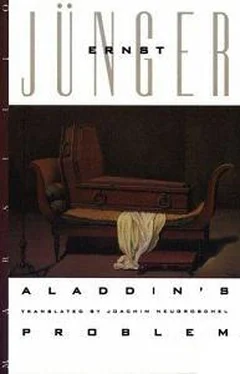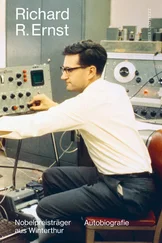This contributed to our family's holding on to its property for another thirty years.
I am not well-versed in these dates, for, while I am enthralled by history, my studies only went up to 1888, the Year of the Three Emperors. For me, that year marks the onset of the labor pains of Titanism, the ahistorical era. That year, Nietzsche decided to build his work "toward the catastrophe," shortly before the breakdown in Turin.
So much for these marginalia, which touch on my problem. My grandfather did not personally benefit from the reprieve he had helped to bring about — he was a younger son. Furthermore, the estates sank deeper and deeper into debt — at least until old Hindenburg's Eastern Aid. My grandfather inherited little; the best thing he got was a comfortable apartment near Charlottenburg Castle. In my childhood, I often visited him there. The rooms were relatively small. They contained old furnishings; and paintings, some of them gifts from monarchs, hung on the walls all the way out into the vestibule. Anything I know about my family history I learned there. Beyond that, more general things, for the old man liked reading memoirs and was a good anecdotist.
I say "the old man," because that was how he struck me back then; basically, he was still quite jaunty. This can be inferred from the mere fact that prior to the second catastrophe he was thinking of donning his uniform once again. But he was already having health problems; his prostate was becoming troublesome, he suffered from gout, which was revealed partly in the strangely elaborate way his fingers curled around his cigarette when he smoked.
33
Given his heritage, my grandfather could have been a stalwart reactionary; but that, as Stirner puts it, was "not his business," or was, at best, his private business. He cultivated this business in his Steglitz apartment with the old furnishings and paintings; outside his apartment, you could not tell. I even think that our left wing lacked people like him. In this respect, I probably inherited a thing or two from him. How else can I explain that after graduating from the Gymnasium, I went back to Liegnitz of my own free will?
In any case, my grandfather resolutely put an end to what he called "old chestnuts." He still subscribed to Das Adelsblatt, an aristocratic gazette, but read liberal newspapers — not just their business sections. He invested his settlement in one of the major insurance firms, and also took a position there. Now he wore suits of Scottish wool and gray ties with a pearl tiepin; the medal in his lapel had been replaced by the Rotarian cogwheel. He loved word games and mental games, and would say: "I have advanced to the position of Rot-Arier [Red Aryan]." He treated his new name similarly, for he had discarded the old one along with his title. "What should I do with it when I call on a client? It would embarrass both of us and interfere with business. We Iduna employees are discreet."
Following the example of Philippe Egalité he named himself Baroh — so that his clients unwittingly addressed him as "Herr Baron." I inherited this name from him and I can introduce myself as Friedrich Baroh.
34
I now come to Uncle Fridolin. My father did not grow old; the location ofhis grave is unknown. His name appears on my grandfather's headstone: "Missing in the Caucasus." He had two sisters: Friederike and Erika. Friederike was an ugly duckling, slightly hunchbacked, but goodnatured and a perfect housewife. Erika was beautiful, she never married, and she died during the destruction of Berlin in circumstances that I prefer not to mention.
The man who chooses a wife like Friederike is heeding a sense of realism that no imagination can dim; and he will not be deceived. Uncle Fridolin was such a man. He too had little to offer in the way of external assets, but he was a reliable man. Gradually, both of them recognized one another in their concealed harmony.
Later, it actually turned out that Friederike had made a good match. She brought along a modest fortune, but Fridolin did not find this out until he asked Grandfather for Friederike's hand, as custom demanded. Fridolin was actually embarrassed by their aristocratic background; it had not determined his choice — something for which his betrothed thought highly of him. "It was a love match," she would say.
On the one hand, Grandfather was not displeased that Friederike was getting hitched; but on the other hand, he was not exactly thrilled. Whenever he wanted to shrug off an adversity, he would lapse into the Potsdam jargon — albeit not as grossly as Papa Wrangel, who had lived in this neighborhood a century ago.
"That's all I needed, Fridolin Gadke, a little bookkeeper — and in a coffin factory to boot. But aside from that, not bad, not bad at all we had a good talk — basically, the girl's a lucky stiff "
35
What could they have had a talk about — and a good one, at that? Life insurance and coffins — these topics made for an initially vague interest, which grew as Uncle Fridolin began to prosper.
In my Gymnasium days, I occasionally paid the couple my obligatory respects. I did not enjoy visiting them, even though Aunt Friederike regaled me nicely. She was very attached to the family. They lived on one ofthe austere streets between the Spree River and Alexanderplatz. Their apartment was kept squeaky-clean and was radiant with lack of taste. The atmosphere was thoroughly unartistic. Conversations never got beyond the most banal subjects.
Uncle Fridolin was an ordinary man such as one meets everywhere in offices and behind counters, and promptly forgets. He was painstakingly neat, energetic, correct. He wore off-the-rack suits plus, as the phrase went in those days, "cuffs and crays" — that is, removable cuffs and a tie.
I found his eyes strange, if not exactly pleasant; they were dark and had what I would like to call a "character gaze," the ability to see character. What I mean is a knack for immediately grasping a person's solvency — and this gift was quite pronounced in him; it surpassed his overall level. Thus he would have very quickly seen through an imposter — not only if the latter had introduced himself as a prince or millionaire, but also as a professor or composer. It must, however, be emphasized that my uncle did not have the foggiest clue about the sciences or the arts. But he did have a sense of, almost a nose for, quality and distinction.
Uncle Fridolin was good at figures and an excellent draftsman; he had served with the Railroad Transit Corps. His talent had soon made him indispensable there, but he had never advanced beyond the rank of private. This did not trouble him; he had done his stint loyally. He was still devoted to the monarchy.
On weekdays, he would rise incredibly early — gingerly so as not wake Friederike. He stepped into a shallow basin and scrubbed himself from head to toe. Then he sat down at his easel and drew. Coffins vary in size and quality; often, personal wishes of customers had to be satisfied. He relied in part on a small library of heraldic, symbolic, and even botanical imagery. Subsequently, he enlarged his collection when he began dealing with headstones as well. Although moderately atheistic, he did have to consult the Bible. He refrained from officially leaving the Church because of his basic conservatism — besides, it was important for his profession.
By the time Friederike served morning coffee (it improved with time), my uncle had already been working for two or three hours. Even when I called on them, I usually found him at his easel. Before greeting me, he would wash his hands and remove his sleeve protectors. We would then converse, mostly about politics — a topic that made him uneasy — and at best, button painting. My aunt would question me about Liegnitz, especially when I had spent my holidays there, and, after making my farewells, I recovered by taking a detour through Treptow Park.
Читать дальше












